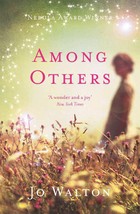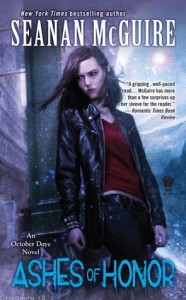|
|
 Good morning Saloners! I come to you this morning a bit disappointed that I haven’t been able to join in the Read-a-thon this time around. I love sitting down with a stack of books and spending an entire day doing very little but reading them. And with my glacial reading pace at the moment, I really could have done with that boost for my totals. We have a houseguest, though, and I don’t plan to ignore her in favor of books, so no participation for me this time around. Good morning Saloners! I come to you this morning a bit disappointed that I haven’t been able to join in the Read-a-thon this time around. I love sitting down with a stack of books and spending an entire day doing very little but reading them. And with my glacial reading pace at the moment, I really could have done with that boost for my totals. We have a houseguest, though, and I don’t plan to ignore her in favor of books, so no participation for me this time around.
This does mean, however, that we have an excuse to go to some of my favorite historic places since she’s never been to them. My husband has finally finished an exam he’s been studying for over the last two and a half weeks, and on weekends for about a month, so our weekends are ours again. Yesterday, we went to Fountains Abbey, which isn’t all that far away from where I live. It was a fairly chilly day, as we’re heading deeper into autumn, and so we didn’t have to contend with the crowds that my husband and I did on our last, warmer visit.
 Might be where the monks stored their food but it’s certainly beautiful now.  The abbey itself  Down the aisle of the church. Fountains Abbey is secluded in a valley and, after the Dissolution of Monasteries by everyone’s favorite Henry VIII, became part of an aristocratic estate which is now all owned by the National Trust. As a result, it still feels calm and peaceful, with a river trickling nearby and impressive later water gardens just past the abbey. Lovely spot on a sunny day, even a chilly one like yesterday.
In reading news, I only managed to finish one book this week, Fate’s Edge by Ilona Andrews. I have made a significant dent in Days of Splendor, Days of Sorrow by Juliet Grey though, and you should expect a review of both this week.
Have a great week, everyone, and I hope you’re all reading wonderful books and enjoying the change in seasons!
 In recent years, since I’ve been keeping track, there have been two books that have catapulted themselves into becoming my instant favorite of the year. The first was The Remains of the Day by Kazuo Ishiguro. The second was The Guernsey Literary and Potato Peel Pie Society by Mary Ann Barrows and Annie Shaffer. The first has remained among my favorites ever, a book that I have forced on a number of people; for some reason my enthusiasm for the second hasn’t quite stuck nearly so much although I did love that book. Among Others by Jo Walton is now the third, a book that spoke to me in so many different ways that I couldn’t help but love it nearly from the first word. In recent years, since I’ve been keeping track, there have been two books that have catapulted themselves into becoming my instant favorite of the year. The first was The Remains of the Day by Kazuo Ishiguro. The second was The Guernsey Literary and Potato Peel Pie Society by Mary Ann Barrows and Annie Shaffer. The first has remained among my favorites ever, a book that I have forced on a number of people; for some reason my enthusiasm for the second hasn’t quite stuck nearly so much although I did love that book. Among Others by Jo Walton is now the third, a book that spoke to me in so many different ways that I couldn’t help but love it nearly from the first word.
Fourteen-year-old Morwenna’s life has been irrevocably changed by magic; from an early age she understood the consequences of wishing for something to be, and now her mother’s magic has cost her her twin sister and the full use of her leg. Mori, as she prefers to be known, runs away from her mother and ends up with her father, who had also run away from her mother, after a stint in a home for children. Sent to boarding school and away from everything and everyone she loves, except for her beloved science fiction, Mori struggles to find a life for herself and escape permanently from her mother’s influence.
There are so many ways in which I connected to this book. For one, very obvious thing, I lost my not-quite-two-years-younger brother when I was a teenager, and while it’s not the same as losing your twin I’m sure, losing a sibling that you’ve been so close to and grown up with changes your life in significant and very similar ways. As Mori notes, “The thing with dying, well, with death really, is that there’s a difference between being someone who knows they can really die at any time and someone who doesn’t.” This is something you learn when you lose your sibling at a young age, the person who you expected to be with you throughout your whole life as they had always been in memory, and the difference between life before and life after simply isn’t the same. Mori is younger than I was, but I felt like I understood her, immediately.
But it’s not just that. It’s the way that Mori grows as the story progresses over the year, the way that she discovers who she is in the absence of her surroundings, what she loves and who she can become, if only she can make that happen. Her journey is nothing less than inspiring, and though it might seem quiet on the outside, if you actually read a summarized plot, it has that ability that books I love best do to show you what happens when it looks, on the outside, like very little is happening at all.
That’s not to mention the fact that Mori loves books and spends her time surrounded by them. She reads mainly science fiction, but she has special places in her heart for fantasy and for historical fiction, and loves to learn the context about the stories she’s reading. I think this book would be even richer for someone who was more familiar with popular science fiction from the 70s, as Mori doesn’t hide her opinions and talks directly about the books she’s reading. For those I did recognize, her quotes and references are intelligent and certainly add an extra layer to the book. It would be nearly impossible, in my mind, for someone who also loves books to not relate to her, and not appreciate the way they save her from difficult situations over and over again.
Anyway, I hope I am getting across my sheer love of this book to you. After I finished, I simply sat for a while and thought of it, and actually couldn’t bring myself to start another book. I didn’t want to let Mori and her world go, not yet. Certainly not before I’d written this review, one of those rare times I’ve finished a book and immediately felt the urge to tell you all about it and persuade you to read it yourself.
So, clearly if you’ve been reading this, Among Others has my whole-hearted, enthusiastic recommendation. Please read this book, and then come back and talk to me about it. It’s won multiple awards, so it isn’t just me that fell in love with it, plenty of others have too.
All external book links are affiliate links. I purchased this book (one of the best pounds I have ever spent).
 It’s been all over the news in the last few weeks in the UK – archaeologists digging in Leicester may well have found Richard III. Even if it wasn’t across the internet, it’s now been covered by the magazines I read. It’s been all over the news in the last few weeks in the UK – archaeologists digging in Leicester may well have found Richard III. Even if it wasn’t across the internet, it’s now been covered by the magazines I read.
When a group of archaeologists from the University of Leicester began digging in a car park in a search for the Franciscan Priory where Richard was supposedly buried, I admit I was sceptical. Archaeology is fantastic and reveals tons of information that informs our understanding of the past, but searching for one person whose burial site has long been lost? I thought they were foolish to publicize the fact that they were actively looking for the king who has been the source of so much speculation because it was so unlikely that they’d find him. Yet here we are, with the archaeologists having found a skeleton that has clear evidence of unhealed battle wounds and one shoulder higher than the other, buried in the highest status position in the church and with evidence of a hurried burial without a coffin. With the dig covered in at least two of the bigger magazines this month, it’s a subject that has attracted a huge amount of attention:

I’m fascinated by this in a sort of morbid way. Like probably most others who study history, I like to visit the mortal remains of the people that I find most interesting. Plenty of them have been lost, and Richard III has always been one of those figures. Finding his bones, if the DNA analysis proves that they are his, changes a few things about history the way we’ve understood it. We may now discover if his shoulder was actually higher on one side and how the end of the battle went, but we’re still not going to know whether or not he killed the famed princes in the tower. Yet this particular king has caught public attention for hundreds of years, both as a popular villain and as a king that some feel deserves a break. He has a society devoted to him and many many works of history and fiction attempting to do one of the two.
I waver between these two attitudes. Understanding the context around the history makes the question even harder to answer, although I tend to lean towards the fact that they were murdered under his watch these days. Will that stop me from visiting his grave, if this is him and when they finally decide where he will lie (in York, as he possibly wished, or in Leicester, where he was found) after all these years? No, I don’t think so. If anything, it’s incredibly interesting to me to watch this unfold, as it will inevitably become part of Richard III’s history, more than five hundred years after his death, even if it isn’t him. It is a tiny part that I actually get to live through, and these reminders that history happens all around us, all the time, are always welcome.
Have you heard about this potential discovery? What are your thoughts?

Unfortunately, in the course of writing this review, I discovered that the author falsified some quotes in the book, and it was withdrawn from sale from both the US and the UK in August 2012. I’m not sure if I can review it now. I actually felt quite betrayed by this, because I’d never have picked up on the false quotes from Bob Dylan myself. I’d still recommend The Decisive Moment, a book about how exactly people go about making decisions, and what impact those decisions might have on others, but I’m afraid this review can no longer stand. This is a shame, because I thought Imagine could have been a fascinating look into human creativity, but unfortunately, it is mainly a poster story for the wrong kind of creativity entirely.
How do you feel when a non-fiction author essentially makes up details to support his thesis? How does this escape the attention of everyone in the publication process?
Another month gone, another monthly wrap-up post. Is it my imagination, or do these posts come closer together as we approach the end of the year?
September was incredibly indicative of the genre fiction I like – historical fiction, fantasy, and science fiction comprised more or less the entirety of the list. I am a bit disappointed that I didn’t manage any non-fiction this month, but my first book for October is non-fiction, so I won’t be too unhappy with that.
Here’s what I read, with 11 books in total:
- A Most Improper Magick, Stephanie Burgis
- Spartacus: Rebellion, Ben Kane
- Small Favour, Jim Butcher
- The Hidden Goddess, M. K. Hobson*
- 1356, Bernard Cornwell
- Ashes of Honor, Seanan McGuire*
- The Flower Reader, Elizabeth Loupas*
- Fledgling, Octavia E. Butler
- Blackout, Mira Grant*
- Daughter of Smoke and Bone, Laini Taylor*
- Imagined Lives: Portraits of Unknown People, anthology*
Except for the truly atrocious lack of reviewing, I haven’t done too badly! I’ve taken a page out of Memory’s book and put an asterisk next to the ones I intend to actually review. I hope by sometimes not reviewing books to be able to feel a bit freer around here – I already have been skipping some in practice, but it is better to get that out there.
Favorite of the Month
 
I just loved the former, for all the reasons I love the October Daye series (and for Tybalt). Fledgling, on the other hand, was a book I enjoyed, but which also made me think, and I don’t always think as deeply about books as I would like to.
I could have added Blackout to this list, but I thought I should probably choose just one of the books by the same author.
What have you read in September that you’d recommend to me?
 This past week, we had a flood here in York. One of the most popular pictures going around on Facebook was Clifford’s Tower, our last particularly visible remnant of York’s two castles, surrounded with water. Here’s one of them, which was shared by English Heritage earlier this week: This past week, we had a flood here in York. One of the most popular pictures going around on Facebook was Clifford’s Tower, our last particularly visible remnant of York’s two castles, surrounded with water. Here’s one of them, which was shared by English Heritage earlier this week:
 photo from English Heritage York floods frequently as a result of being in a valley and situated in between two rivers, the Fosse and the Ouse. In short, the reason for the town’s location and, in the past, prosperity, results in the flood which threaten it. usually it’s the Ouse that floods. Usually the floods don’t get far enough to do much other than overflow the river’s banks and get in the racecourse and the gardens, but this one was worse than usual. We were fortunately unaffected, although some drains overflowed just two streets away from ours and did get into people’s houses and a local pub’s cellar, but it served as a stark reminder that we’re never too far from Mother Nature’s wrath, even in a country which doesn’t suffer from the natural phenomenons that plague so many others. The flood is now receding, and I’m hoping the recovery for the people and livelihoods harmed by it is smooth and quick.
In reading news, I’ve spent most of the week buried in Blackout by Mira Grant. It’s been strange to read this straight after reading Ashes of Honor, which is written by the same author under her real name. The books have very different feels to them, except for a few things, one of which is the way both main characters absolutely crave a particular caffeinated drink. For one, it’s coffee, for the other, it’s Coke – and I don’t really remember reading too many main characters with such obvious addictions. Definitely curious, but both are fantastic books and well worth your time.
I’m now about halfway through Daughter of Smoke and Bone by Laini Taylor and hoping to finish today to round off this month’s reading. Can’t believe, as usual, that tomorrow is October, and we are well and truly into fall, but at least this season is perfect for curling up under a blanket with a great book.
How was your week? Anything exciting coming up for you in October?
 A young, dark-skinned girl awakens in the woods, unsure of who or what she is, burned across the huge majority of her skin, with massive head injuries. Shori slowly begins to understand the world around her and recall knowledge, but her past is lost to her. Though she has the appearance of a ten or eleven-year-old girl, Shori is actually fifty-three years old, a vampire, and needs blood to survive. Genetically modified to survive in the sunlight and stay awake during the day, Shori is anathema to some of her kind, and her very nature makes her a target and a threat to all she holds dear. A young, dark-skinned girl awakens in the woods, unsure of who or what she is, burned across the huge majority of her skin, with massive head injuries. Shori slowly begins to understand the world around her and recall knowledge, but her past is lost to her. Though she has the appearance of a ten or eleven-year-old girl, Shori is actually fifty-three years old, a vampire, and needs blood to survive. Genetically modified to survive in the sunlight and stay awake during the day, Shori is anathema to some of her kind, and her very nature makes her a target and a threat to all she holds dear.
When Aarti proposed this week’s A More Diverse Universe blog tour, I knew immediately that I wanted to read something by Octavia Butler. I have for some time now, and this gave me the perfect excuse to finally get one of her books – the bookstore near me never seem to have them in stock – and actually find out what her writing style was like. I was rewarded with a vampire book that genuinely made me think about racism, with a few telling moments, but which also provided a story that I found compelling and interesting.
The main thread of the story focuses on the fact that someone is trying to kill Shori and the quest to find out who it is and bring them to justice. She doesn’t necessarily realize this at first, as she’s forgotten everything that happened to her. But slowly it becomes obvious that she is the target. Whether it’s because she has dark skin amidst pale, blond vampires, because she’s human, or because she’s genetically engineered, Shori must face up front people’s bigotry and dislike of her based on factors that she can’t control and that have nothing to do with who she is.
The fact that Shori has lost her memory gives the story a perfect way to impart this information to us, and there was indeed a considerable amount of detail on the Ina societies and how they sustain themselves. Despite the fact that Shori’s life is under threat, this isn’t really a book with a lot of action; some of the final scenes take place in a courtroom of sorts, rather than with violence. I found all of the detail really interesting and the way the society was fleshed out held my interest throughout. It was a short book, so I didn’t feel it was moving slowly at all in this respect.
The one aspect that made me vaguely uncomfortable was Shori’s age appearance. Picturing her as a ten year old sleeping with a twenty-five year old man really wasn’t a pleasant mental image. It’s easy to understand that their lure is incredibly strong, but it still put me off when scenes of that nature occurred.
The real attraction of the book, anyway, is how Butler questions the racism of the people around Shori. It could be any number of reasons why, and she experiences several of them to a certain degree. For example, on questioning a human who has just tried to kill her, Shori is presented with the strange dichotomy of a racist who can love a black person that he is related to, but is still racist against all black people. After he calls her filthy names, he continues saying:
I didn’t mean to call you … what I called you. My sister, she married a Dominican guy. Her kids are darker than you, and they’re my blood, too. I would kick the crap out of anyone who called them what I called you.
 And indeed Shori faces this problem several times – a person can know and love someone who appears different from him or herself, but remain racist against others just like them. And indeed Shori faces this problem several times – a person can know and love someone who appears different from him or herself, but remain racist against others just like them.
All in all, Fledgling is a very thoughtful book, vastly different from most out there featuring vampires, and definitely recommended.
For more blogs on the tour and to view the great range of reviews already, visit the tour schedule. Huge thanks to Aarti for organizing this fantastic week!
 Thomas of Hookton and his men, familiar to readers of Bernard Cornwell after the events of his Grail Quest series, are still in the middle of France, seeking to help Edward III and his son Edward, the Prince of Wales, called the Black Prince but not in his own time, to win the Hundred Years’ War. Focusing on the Battle of Poitiers, a true historic battle fought by the Black Prince, Cornwell takes Thomas around the lead-up to the battle where he must seek another holy relic, protect his wife and his men, and face down corruption from the Church’s most inner circles. Thomas of Hookton and his men, familiar to readers of Bernard Cornwell after the events of his Grail Quest series, are still in the middle of France, seeking to help Edward III and his son Edward, the Prince of Wales, called the Black Prince but not in his own time, to win the Hundred Years’ War. Focusing on the Battle of Poitiers, a true historic battle fought by the Black Prince, Cornwell takes Thomas around the lead-up to the battle where he must seek another holy relic, protect his wife and his men, and face down corruption from the Church’s most inner circles.
I love reading Bernard Cornwell’s medieval historical fiction; when I’m reading one of his books, I feel I’m actually getting fairly close to the way things would have been in a battle, at least as close as fiction can bring me at present. Cornwell does sometimes like to introduce slight supernatural elements which do serve to remind me that actually, I’m not in the *real* 1356. In context, though, knowing that people of this era believed that they had holy relics and deeply in the power of their religion, this works surprisingly well, and doesn’t ruin the feel of the book for me at all. In this book, Thomas is after a sword; in his previous trilogy, he sought the Holy Grail.
Throughout 1356, the characters do move around the countryside, and we learn about many of the things that made the Black Prince and the Hundred Years’ War relatively famous. The chevauchées throughout the countryside, weakening the French significantly, the practice of tournaments, and the strength of the English archers and the significant advantage they represented all feature majorly in the book. Chivalry is demonstrated most eloquently through a particular character, Roland, who believes himself to be a knight without reproach, convinced by romances that he was meant to always fight honorably and in a certain way. He learns, over the course of the book, that actually, it’s about winning, not really so much about remaining honorable at this stage in history. Chivalry is a fascinating subject and one that I spent some time studying, and I loved that Cornwell featured a small tournament on the outskirts of the battle, as did genuinely happen, as part of Roland’s learning process.
As usual, Cornwell’s battle scenes are gripping and his writing kept me very interested as I progressed through the book. I really like his down-to-earth style. I generally don’t feel too attached to his characters, but I felt like this set of them was very well-rounded, as though they could have been real people, helped by the fact that I’ve read books featuring them before. Even the new additions stand out in my memory, though, and I liked how they faced individual challenges, yet all had a part to play in the massive battle that came at the end.
Overall, another excellent addition to Cornwell’s impressive collection of historical fiction works. You needn’t read the Grail Quest series to enjoy this book, although I do think it adds to it – all you need is a keen interest in history. Recommended.
All external book links are affiliate links. I received this book for free for review from the publisher.
 Bernard Cornwell’s latest novel, 1356, releases this week from Harper Collins in the UK. In honor of the release, the publisher has given me permission to share this excerpt with you – a perfect demonstration of just how excellent Cornwell is at writing battle scenes. Enjoy, and I hope you’ll return to read my review of the whole book tomorrow! Bernard Cornwell’s latest novel, 1356, releases this week from Harper Collins in the UK. In honor of the release, the publisher has given me permission to share this excerpt with you – a perfect demonstration of just how excellent Cornwell is at writing battle scenes. Enjoy, and I hope you’ll return to read my review of the whole book tomorrow!
“The dauphin’s battle aimed itself at the centre of the English line. The widest gap in the hedge was there and, as the French came closer, they saw the largest banners flying above the waiting men-at-arms beyond the gap, and those banners included the impudent flag that quartered the French royal arms with England’s lions. That banner proclaimed that the Prince of Wales was there and, through the slits in their visors, the French could see the prince mounted on a horse, sitting close behind the line, and the battle anger was on them now. Not just anger, but terror, and for some men joy. Those men worked their way to the front rank. They were hungry for fighting, they were confident, and they were savagely good at their trade. Many other men were drunk, but the wine had given them bravado, and the arrows were slicing in from left and right, striking shields, crumpling on armour, sometimes finding a weak spot, but the attack flowed around the fallen men and, so very close now, the French broke into a run, screaming, and fell on the English.
That first rush was the most important. That was when the shortened lances could knock the enemy over, when the axes and hammers and maces would be given extra impetus by the charge, and so the dauphin’s men screamed at the tops of their voices as they charged, as they swung, thrust, and chopped their weapons.
And the English line went back.
They were forced back by the fierceness of the charge and by the weight of men who crammed through the gap, but though they went back, they did not break. Blades crashed on shields. Axes and maces slashed down. Lead-weighted steel crumpled helmets, shattered skulls, forced blood and brains to spurt through split metal, and men fell and in falling made obstacles, and other men tripped on them. The impact of the charge was slowed, men tried to stand and were stunned by blows, but the French had forced their way through the gap and now were widening the fight, attacking left and right as more men came through the hedge.
The English and Gascons were still being driven back, but slowly now. The initial impact had left men dead, wounded, bleeding, and moaning, but the line was not broken. The commanders, their horses close behind the dismounted men-at-arms, were shouting at them to stay closed up. To keep the line. And the French were trying to break the line, to cut and hammer their way through the shields so they could shatter the English into small groups that could be surrounded and slaughtered. Men hacked with axes, screamed obscenities, thrust with lances, swung maces, and the shields splintered, but the line held. It went backwards under the pressure, and more Frenchmen came through the gap, but the Englishmen and Gascons were fighting with the desperation of trapped men and the confidence of troops who had spent months together, men who knew and trusted each other, and who understood what waited for them if the line broke.
‘Welcome to the devil’s slaughteryard, sire,’ Sir Reginald Cobham said to the Prince of Wales.”
I received this book for free for review.
 In this second volume of Ben Kane’s Spartacus duology (read my review of the first), Spartacus has already been acknowledged as a serious threat to the Roman people. While he and his pregnant wife Ariadne are keen to return his army to Thrace and re-take his homeland, his army, made up of slaves from across the empire, is more interested in plundering Rome’s heartland and establishing a base where the land is rich. Spartacus has to choose whether to retake his homeland, but lose his army in the process, or stay in Rome and attempt to subvert the incredible power of the Roman state. In this second volume of Ben Kane’s Spartacus duology (read my review of the first), Spartacus has already been acknowledged as a serious threat to the Roman people. While he and his pregnant wife Ariadne are keen to return his army to Thrace and re-take his homeland, his army, made up of slaves from across the empire, is more interested in plundering Rome’s heartland and establishing a base where the land is rich. Spartacus has to choose whether to retake his homeland, but lose his army in the process, or stay in Rome and attempt to subvert the incredible power of the Roman state.
As with Spartacus: The Gladiator, Ben Kane delivers an action-paced historical fiction novel with Spartacus: Rebellion. Their release relatively close together means that we can seamlessly pick up the story from one to the other, and that’s really the way these books are meant to be read. They are two halves of one story that really belongs in one, and neither book will really stand alone particularly well without the other, especially not this one. It picks up right after the events of the first book and all of the tensions between the characters already exist and intensify over the course of the book.
This might come as a surprise to you, but I actually didn’t know what happened to Spartacus at the end of the book. I won’t spoil it, but this made the book far more gripping than normal historical fiction fare is. Spartacus and all of the people around him really do have to fight for their lives, as the Roman state out in force is determined to kill them and eradicate any threat that they represent to the orderly Roman way of life, slaves and all. It made for a surprisingly exciting book, and I really enjoyed feeling like I had no idea what was going to happen next.
As I’ve mentioned for the previous book in this set of two, Ben Kane writes historical fiction in what I tend to call the “gritty” way. There is no court here, no fancy trappings or much political intrigue; there is battle, and blood, and death, and deception. It’s a refreshing change when you read quite a bit of historical fiction focused on royalty and the people at the top, and though Spartacus is certainly a leader of his men, he doesn’t get puffed up with ego and remains very much an inspiring character, for both the men in the book and for the reader.
This duology is an excellent choice for anyone who prefers the “grittier” historical fiction with all of the violence that entails, or those who are interested in fiction set during the Roman Republic. Definitely recommended.
All external book links are affiliate links. I received this book for free for review.
|
|
 Good morning Saloners! I come to you this morning a bit disappointed that I haven’t been able to join in the Read-a-thon this time around. I love sitting down with a stack of books and spending an entire day doing very little but reading them. And with my glacial reading pace at the moment, I really could have done with that boost for my totals. We have a houseguest, though, and I don’t plan to ignore her in favor of books, so no participation for me this time around.
Good morning Saloners! I come to you this morning a bit disappointed that I haven’t been able to join in the Read-a-thon this time around. I love sitting down with a stack of books and spending an entire day doing very little but reading them. And with my glacial reading pace at the moment, I really could have done with that boost for my totals. We have a houseguest, though, and I don’t plan to ignore her in favor of books, so no participation for me this time around.




















Recent Comments